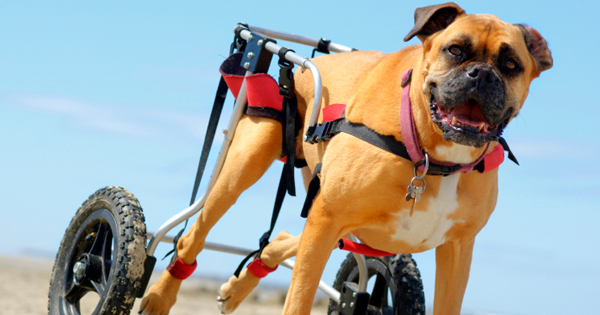Like people, pets can overcome a wide range of disabilities to lead happy and full lives. This means that dogs and cats with missing limbs, mobility impairments, deafness, blindness, seizure disorders, neurological diseases and other health challenges can still be wonderful and loving companions. Owners of handicapped pets, however, do need to take special care to provide for the needs of their handicapped pets.

Caring for Handicapped Pets
Food and Water Making sure your disabled pet has access to fresh water and high-quality food is extremely important. If you have a dog or cat with a problem getting around, you need to make sure the animal can reach its food. This may simply require keeping the food on the same floor as the pet, or it may require carrying the food to the dog or cat. If your pet is blind or losing its sense of smell, the animal may require food that has a strong smell, such as canned food or food that has been warmed. A pet with a neuromuscular disorder that causes problems with swallowing might need its food and water dishes elevated.
Mobility for Disabled Pets If your pet is missing a limb, has arthritis or other mobility issues, make sure it can get to its food, bed, toys and litter easily. If you have a multi-story home, consider placing all of these things on one floor. For a disabled pet that has a lot of trouble walking, also consider using a mobility aid, such as a sling or a dog wheelchair, to keep the animal mobile. If you are the owner of a blind pet or a pet with a visual impairment, avoid moving furniture or changing your pet’s environment unless absolutely necessary.
Attention and Play Older and disabled pets need just as much mental stimulation as other pets. This means that you need to spend time with your disabled pet and provide appropriate toys for the animal. Make sure to take your pet’s disability into account when choosing toys. For example, if you have a pet with visual problems, try to choose toys, like food puzzles, that appeal to its other senses.
Regular Veterinary Care While it is important for all pets to have regular veterinary care, it is especially important for disabled pets to have regular check ups with a veterinarian. In addition to helping you manage your pet’s condition, your veterinarian can spot problems, such as pressure sores, obesity, injuries and others, that can occur due to your pet’s disability. With early detection, you can treat your pet before these problems become serious.